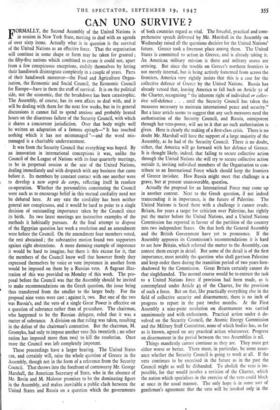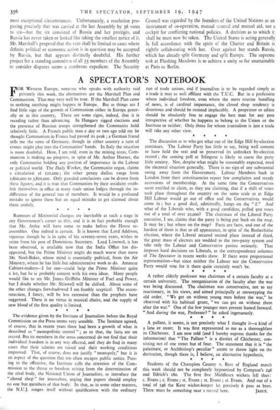CAN UN . 0
SURVIVE?
FFORMALLY, the Second Assembly of the United Nations is in session in New York State, meeting to deal with an agenda of over sixty items. Actually what is in question is the survival of the United Nations as an effective force. That the organisation will continue in some shape or form may be taken for granted ; the fifty-five nations which combined to create it could not, apart from a few conspicuous exceptions, stultify themselves by letting their handiwork disintegrate completely in a couple of years. Parts of their handiwork moreover—the Food and Agriculture Organ- isation, he Economic and Social Council, the Economic Council for Europe—have in them the stuff of survival. It is on the political side, not the economic, that the breakdown has been catastrophic. The Assembly, of course, has its own affairs to deal with, and it will be dealing with them for the next few weeks, but in its general discussions it cannot fail to spend anxious and probably heated hours on the disastrous failure of the Security Council, with which it shares a concurrent jurisdiction. Over that body might well be written an adaptation of a famous epitaph—" It has touched nothing which it has not mismanaged "—and the word mis- managed is a charitable understatement.
It was from the Security Council that everything was hoped. By an innovation in international conceptions it was, unlike the Council of the League of Nations with its four quarterly meetings, to be in perpetual session at the seat of the United Nations, dealing immediately and with despatch with any business that came before it. Its members by constant contact with one another were to develop a new esprit de corps, reflecting itself in resolute co-operation. Whether the personalities constituting the Council were such as to encourage belief in this mutual cordiality need not be debated here. At any rate the cordiality has been neither general nor conspicuous, and it would be hard to point to a single decision of outstanding importance taken by the Council since its birth. Its two latest meetings are instructive examples of the methods it habitually pursues. At the final attempt to dispose of the Egyptian question last week a resolution and an amendment were before the Council. On the amendment four members voted, the rest abstained ; the substantive motion found two supporters against eight abstentions. A more damning example of impotence it would be hard to imagine, but there is this excuse for it, that the members of the Council knew well that however firmly they expressed themselves by voice or vote impotence in another form would be imposed on them by a Russian veto. A flagrant illus- tration of this was provided on Monday of this week. The pro- posal before the Council was that the Assembly should be invited to make recommendations on the Greek question, the issue being thus transferred from the smaller to the larger body. For the proposal nine votes were cast ; against it, two. But one of the two was Russia's, and the veto of a single Great Power is effective on a question of substance rather than of procedure. The chairman, who happened to be the Russian delegate, ruled that it was a matter of substance. A division on that ruling was taken, resulting in the defeat of the chairman's contention. But the chairman, M. Gromyko, had only to impose another veto (his twentieth ; no other nation has imposed more than two) to kill the resolution. Once more the Council was left completely impotent.
These proceedings have a larger bearing. The United States can, and certainly will, raise the whole question of Greece in the Assembly, though not in the form of a reference from the Security Council. That throws into the forefront of controversy Mr. George Marshall, the American Secretary of State, who in the absence of Mr. Bevin and M. Molotov promises to be the dominating figure in the Assembly, and makes inevitable a public clash between the United States and Russia on a question which the governments of both countries regard as vital. The forceful, practical and com- prehensive speech delivered by Mr. Marshall in the Assembly on Wednesday raised all the questions decisive for the United Nations' future. Greece took a foremost place among them. The United States is committed to action in Greece, and is already taking it. An American military mission is there and military stores are arriving. But since the trouble on Greece's northern frontiers is not merely internal, but is being actively fomented from across the frontiers, America very rightly insists that this is a case for the collective defence of Greece by the United Nations. Russia has already vetoed that, leaving America to fall back on Article 51 of the Charter, recognising " the inherent right of individual or collec- tive self-defence . . . until the Security Council has taken the measures necessary to maintain international peace and security." But a later article seems to suggest that any such measures need the authorisation of the Security Council, and Russia, omnipotent through her veto-power, will see to it that no such authorisation is given. Here is clearly the making of a first-class crisis. There is no doubt Mr. Marshall will have the support of a large majority of the Assembly, as he had of the Security Council. There is no doubt, either, that America will go forward with her defence of Greece. It is thought likely, indeed, that failing to secure collective action through the United Nations she will try to secure collective action outside it, inviting individual members of the Organisation to con- tribute to an International Force which should keep the frontiers of Greece inviolate. How Russia might meet that challenge is a grave, but at present unanswerable, question.
Actually the proposal for an International Force may come up in another context. Next to the Greek question, if not indeed transcending it in importance, is the future of Palestine. The United Nations is faced there with a challenge it cannot evade. Britain, for years a target for criticism over Palestine, has rightly put the matter before the United Nations, and a United Nations Commission has reported in favour of the partition of the country into two independent States. On that both the General Assembly and the British Government have yet to pronounce. If the Assembly approves its Commission's recommendations it is hard to see how Britain, which referred the matter to the Assembly, can contest them except in detail. But some of the detail is of the first importance, most notably the question who shall garrison Palestine and keep order there during the transition period of two years fore- shadowed by the Commission. Great Britain certainly cannot do that singlehanded. The normal course would be to entrust the task to a United Nations force if provision had been made, as is contemplated under Article 43 of the Charter, for the provision of such a force. But on that, like practically everything else in the field of collective security and disarmament, there is no inch of progress to report in the past twelve months. At the First Assembly a nine-point resolution on disarmament was carried unanimously and with enthusiasm. Practical action under it de- volved on the Security Council, the Atomic Energy Commission and the Military Staff Committee, none of which bodies has, so far as is known, agreed on any practical action whatsoever. Progress on disarmament in the period between the two Assemblies is nil.
Things manifestly cannot continue as they are. They must get either worse or better. There must, in particular, be some assur- ance whether the Security Council is going to work at all. If the veto continues to be exercised in the future as in the past the Council might as well be disbanded. To abolish the veto is im- possible, for that would involve a revision of the Charter, which the nation which specialises in the exercise of the veto could block at once in the usual manner. The only hope is in some sort of gentleman's agreement that the veto will be invoked only in the most exceptional circumstances. Unfortunately, a resolution pro- posing precisely that was carried at the last Assembly by 36 votes to six—but the six consisted of Russia and her protégés, and Russia has never taken or looked like taking the smallest notice of it. Mr. Marshall's proposal that the veto shall be limited to cases where definite political or economic action is in question may be accepted by Russia, but that appears distinctly doubtful. His further project for a standing committee of all 55 members of the Assembly to consider disputes seems a cumbrous expedient. The Security Council was regarded by the founders of the United Nations as an instrument of co-operation, mutual ccunsel and mutual aid, not a cockpit for conflicting national policies. A decision as to which it shall be must now be taken. The -United States is acting generally in full accordance with the spirit o! the Charter and Britain is rightly collaborating with her. Over against her stands Russia, which has already split Germany and split Europe. The supreme task at Flushing Meadows is to achieve a unity so far unattainable at Paris or Berlin.



































 Previous page
Previous page